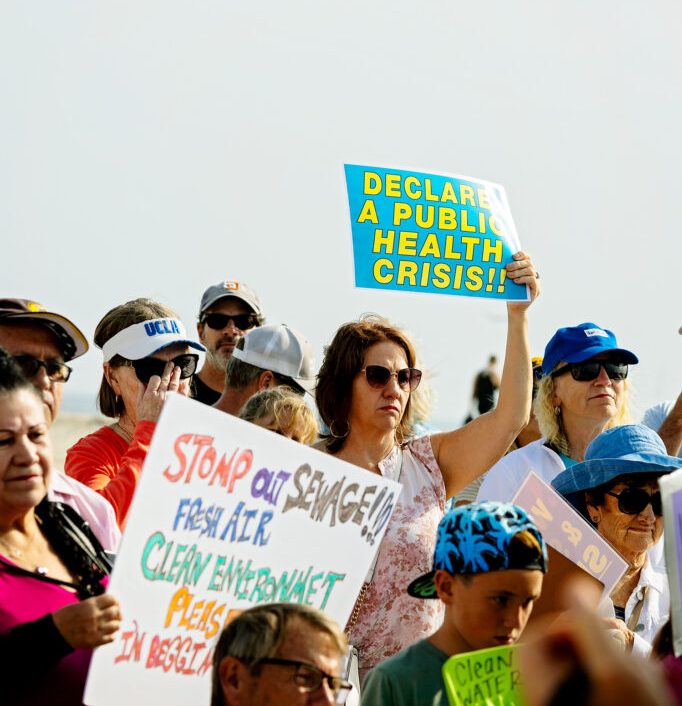
Local environmental groups are threatening a lawsuit against the federal body that oversees water treatment infrastructure that contributes to the Tijuana sewage crisis.
A joint notice of intent to sue the International Boundary and Water Commission was sent by the nonprofits San Diego Coastkeeper and the Coastal Environmental Rights Foundation on Dec. 28.
The nonprofits will sue, the 24-page letter says, if the IBWC does not address alleged violations of the Clean Water Act and the facility’s National Pollutant Discharge Elimination Permit within 60 days. Legally, this notice is required before a citizen’s civil lawsuit can be filed.
Under the Clean Water Act, no pollutants may be discharged into water in the United States without a permit. The IBWC holds such a permit, but is not complying with it, the nonprofits say.
Maria-Elena Giner, commissioner for the IBWC has said publicly that the South Bay International Wastewater Treatment Plant is out of compliance with its permit, and that the commission is working to bring the plant back into compliance.
The IBWC is underfunded, and the cost of both maintenance of and repairs for wastewater infrastructure dwarves the commission’s entire budget. Federal money was allocated for repairs in the 2023 budget, but it is not enough to solve the problem. Although politicians and grassroots organizations are pressuring Congress for more money, the IBWC currently is making only the repairs it can afford.
“We are holding ourselves accountable,” Giner said before the California Coastal Commission in October. “We agree that it’s unacceptable that you do not have access to your beaches, it is unacceptable that you cannot use the public amenities of the estuary, and it’s unacceptable, the health impacts associated with that.”
The nonprofits’ letter of intent says the IBWC has “chronically” violated its permit by exceeding its volume limitations, committing transboundary flow violations, failing to self-monitor, and failing to provide public access to a scientific study the commission was required to participate in.
The IBWC’s permit for the South Bay International Wastewater Treatment Plant mandates both how much water may be released (effluent flow) and how much may be received (influent flow).
“At least 500 effluent limitation violations have been identified between Nov. 1, 2018 and July 31, 2023,” the letter reads, accusing the IBWC of discharging “at least 22,122% over the discharge limit” of polychlorinated biphenyls, a carcinogen banned by the U.S. in 1979.
Similarly, dry weather flows are increasing, the letter says, noting that the wastewater treatment plant “discharges exceptionally high bacteria levels via dry weather canyon collector spill events.” In the three-month period between Nov. 2020 and Feb. 2021, there were 19 such spills, the letter says, resulting in more than 1.2 million gallons of untreated wastewater flowing into U.S. waters.
These spill events violate discharge prohibitions outlined in the California Water Board’s Basin Plan, the letter states. Further, the IBWC’s canyon collectors frequently create transboundary flows that discharge pollutants into the Tijuana River Valley at rates above the water board’s quality objectives.
Transboundary flow events and spill events are commingled, the letter says, because the IBWC “routinely fails” to identify its spill events, making it “difficult to identify canyon collector transboundary flow events that also constitute spill events.”
The IBWC is required to release self-monitoring reports, which include, among other requirements, reports of permit violations. The environmental groups say that the IBWC is not sufficiently self-reporting. Further, it was required to participate in the Coastal Remote Sensing Study and report its results to the public, but it did not, “depriving the public of meaningful information” regarding the impact of South Bay Ocean Outfall discharge, the letter says.
The environmental groups say the failure of IBWC to self-report is a violation of public trust. Since 2019, the letter says, the IBWC has not reported chronic toxicity data, its flow violations, or outlined corrective actions taken against such violations.
“These omissions have the disconcerting effect of misleading the public by fostering a false impression that fewer violations have occurred than the actual number,” the letter states.
The IBWC has not yet responded to requests for comment.
San Diego Coastkeeper and CERF said the organizations are open to discussing solutions before their notice of intent to sue matures on Feb. 26. However, if an agreement is not reached by then, they said they will file a lawsuit.




